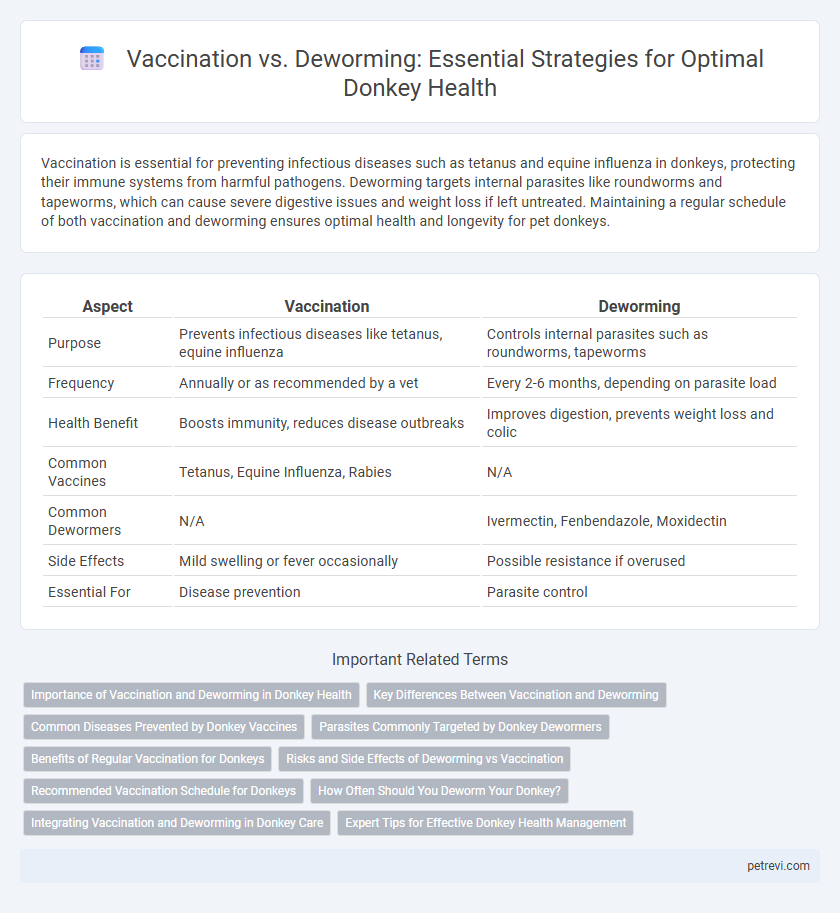Vaccination is essential for preventing infectious diseases such as tetanus and equine influenza in donkeys, protecting their immune systems from harmful pathogens. Deworming targets internal parasites like roundworms and tapeworms, which can cause severe digestive issues and weight loss if left untreated. Maintaining a regular schedule of both vaccination and deworming ensures optimal health and longevity for pet donkeys.
Table of Comparison
| Aspect | Vaccination | Deworming |
|---|---|---|
| Purpose | Prevents infectious diseases like tetanus, equine influenza | Controls internal parasites such as roundworms, tapeworms |
| Frequency | Annually or as recommended by a vet | Every 2-6 months, depending on parasite load |
| Health Benefit | Boosts immunity, reduces disease outbreaks | Improves digestion, prevents weight loss and colic |
| Common Vaccines | Tetanus, Equine Influenza, Rabies | N/A |
| Common Dewormers | N/A | Ivermectin, Fenbendazole, Moxidectin |
| Side Effects | Mild swelling or fever occasionally | Possible resistance if overused |
| Essential For | Disease prevention | Parasite control |
Importance of Vaccination and Deworming in Donkey Health
Vaccination plays a critical role in protecting donkeys from infectious diseases such as tetanus, equine influenza, and rabies, reducing mortality and improving overall herd immunity. Deworming is essential to control internal parasites like strongyles and roundworms, which can cause weight loss, colic, and anemia, thereby enhancing digestive health and nutrient absorption. Regular vaccination and strategic deworming protocols tailored to donkeys' specific needs ensure optimal health, productivity, and longevity.
Key Differences Between Vaccination and Deworming
Vaccination in donkeys involves administering vaccines to stimulate the immune system against specific infectious diseases such as tetanus, equine influenza, and rabies, providing long-term protection. Deworming targets internal parasites like strongyles, roundworms, and tapeworms by using anthelmintic medications to eliminate or control parasite infestations that impact digestive health. The key difference lies in vaccination preventing viral or bacterial infections through immune response enhancement, while deworming controls parasitic worm burdens to maintain gastrointestinal and overall health.
Common Diseases Prevented by Donkey Vaccines
Donkey vaccination effectively prevents common diseases such as tetanus, equine influenza, and West Nile virus, which pose significant health risks to these animals. Deworming primarily targets internal parasites like strongyles and roundworms, reducing the risk of digestive and weight loss issues but does not protect against viral or bacterial infections. Combining vaccination schedules with regular deworming ensures comprehensive health management for donkeys, improving their longevity and overall well-being.
Parasites Commonly Targeted by Donkey Dewormers
Donkey deworming targets parasites such as strongyles, roundworms, and tapeworms, which significantly impact equine health by causing colic, weight loss, and poor coat condition. Vaccination protects against viral and bacterial infections like tetanus and equine influenza but does not address internal parasites. Regular deworming, combined with strategic vaccination programs, ensures optimal donkey health by controlling both infectious diseases and parasitic infestations.
Benefits of Regular Vaccination for Donkeys
Regular vaccination in donkeys significantly enhances their immune response, preventing contagious diseases such as tetanus, equine influenza, and West Nile virus. Consistent immunization not only reduces the risk of outbreaks but also promotes overall herd health and longevity. Vaccination minimizes veterinary costs and improves donkeys' productivity by maintaining optimal health and preventing debilitating illnesses.
Risks and Side Effects of Deworming vs Vaccination
Deworming in donkeys carries risks such as anthelmintic resistance and potential disruption of beneficial gut flora, leading to digestive issues. Vaccination side effects are generally mild, including localized swelling or transient fever, but carry less risk compared to deworming complications. Balancing regular monitoring with targeted treatments minimizes adverse effects and enhances overall donkey health.
Recommended Vaccination Schedule for Donkeys
Donkeys require a tailored vaccination schedule to protect against diseases such as tetanus, equine influenza, and rabies, with initial vaccinations typically starting at 4-6 months of age followed by boosters every 6-12 months. Regular deworming complements vaccination by controlling internal parasites like strongyles and roundworms, which can compromise immune response and overall health. Maintaining a veterinarian-approved vaccination and deworming plan ensures optimal health and longevity for donkeys.
How Often Should You Deworm Your Donkey?
Deworming your donkey is essential for maintaining optimal health and preventing parasitic infections that can cause weight loss and colic. Typically, donkeys should be dewormed every 6 to 8 weeks, depending on their grazing environment and parasite burden, with fecal egg counts guiding treatment frequency. Vaccinations complement this by protecting against infectious diseases, but regular deworming remains a crucial component of a comprehensive equine health management plan.
Integrating Vaccination and Deworming in Donkey Care
Integrating vaccination and deworming in donkey care is essential for maintaining optimal health and preventing common infectious diseases and parasitic infestations. Regular vaccination programs targeting tetanus, equine influenza, and rabies combined with scheduled deworming against strongyles, roundworms, and tapeworms ensure comprehensive disease protection and improved immune response. Coordinated protocols developed by veterinarians enhance overall donkey wellbeing and reduce the risk of treatment resistance and secondary complications.
Expert Tips for Effective Donkey Health Management
Effective donkey health management relies heavily on timely vaccination and regular deworming to prevent common infectious diseases and parasitic infections. Experts recommend a vaccination schedule targeting tetanus, equine influenza, and rabies, alongside strategic deworming based on fecal egg count tests to reduce parasite resistance. Consistent veterinary consultation ensures tailored protocols enhancing immune defense while minimizing complications from overmedication.
Vaccination vs Deworming for Donkey Health Infographic

 petrevi.com
petrevi.com